NOTE: Download PDF for most up-to-date course offerings for Spring 2024
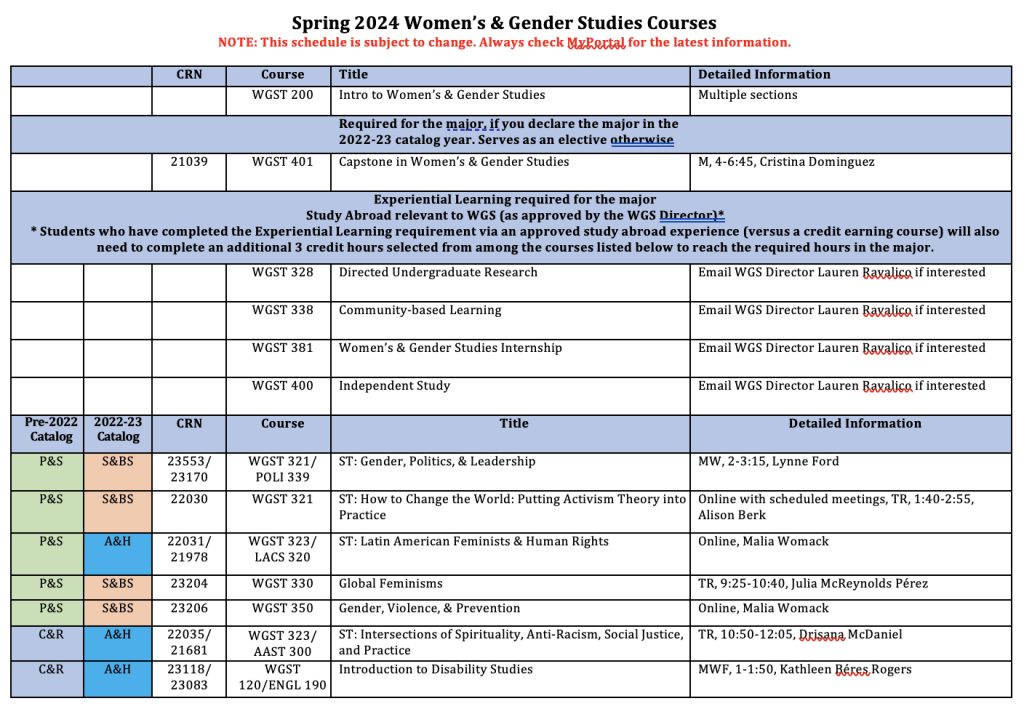
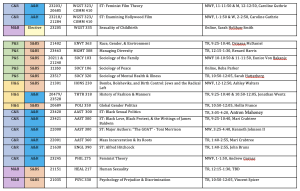
NOTE: Download PDF for most up-to-date course offerings for Spring 2024



Register for Queer & Trans Studies for Spring 2023!
This course offers a selective, interdisciplinary introduction to queer and trans studies within LGBTQ+ studies. Students will explore trans and queer history; theoretical and conceptual writing; auto-ethnography and ethnography; autobiography, memoir, creative writing, film/tv and art; political writing and documentaries. Drawing on the #TransJustice Syllabus and other sources, some focal areas of this course are QTBIPOC (queer and trans Black, Indigenous, and People of Color) and white anti-racist accomplice theorizing and feminisms, bodies and health, family and community building, nationalism and migration, criminalization and abolition, and, social justice organizing/movement work. Guiding questions that we will ask ourselves in this course include the following: What are some central concerns for queer and trans peoples/communities? How are visibility, representation, and inclusion problematic? and lastly, What do historic and contemporary trans and queer lived experiences and perspectives teach us all (those of us who are queer and trans and those of us who are not) about resistance, resilience, and futurity?
WGST 321.01
CRN 23237
Mondays, 4-6:45PM
Prof. Cristina Dominguez (They/Them)
Artwork by the amazing and fabulous Art Twink!
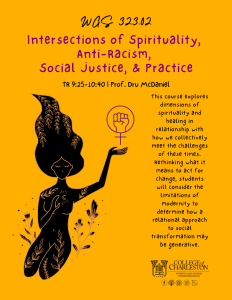
Enroll in Intersections of Spirituality, Anti-Racism, Social Justice, & Practice!
This course explores dimensions of spirituality and healing in relationship with how we collectively meet the challenges of these times. Rethinking what it means to act for change, students will consider the limitations of modernity to determine how a relational approach to social transformation may be generative.
WGS 323.02
CRN 23244
TR 9:25-10:40
Prof. Dru McDaniel (She/Her)
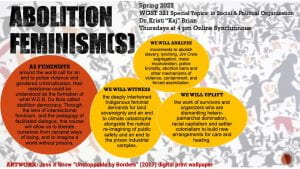
WGS is offering another great option for a special topics course in the spring: Abolition Feminism(s)!
As feminists around the world call for an end to police violence and gendered criminalization, their resistance could be understood as the formation of what W.E.B. Du Bois called abolition democracy. Through the lens of intersectional feminism, and the pedagogy of facilitated dialogue, this course will allow us to liberate ourselves from carceral ways of being and to imagine a world without prisons. We will witness the deeply intertwined Indigenous feminist demands for land sovereignty and an end to climate catastrophe, alongside the radical re-imagining of public safety and an end to the prison industrial complex. We will analyze movements to abolish slavery, lynching, Jim Crow segregation, mass incarceration, police brutality, abortion bans and other mechanisms of violence, containment, and forced assimilation. And we will uplift the work of survivors and organizers who are dismantling hetero-patriarchal domination, racial capitalism, and settler colonialism to build new arrangements for care and healing.
WGST 321.02
CRN 23238
Thursdays, 4-6:45PM (online synchronous)
Prof. Kristi “Kaj” Brian (She/They)
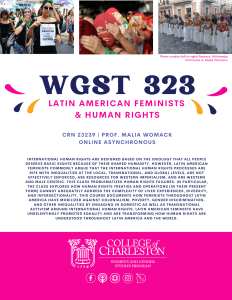
Interested in Latin American feminist and human rights movements? Of course you are! Learn more about this topic by registering for WGS’ special topics course in the spring.
International human rights are designed based on the ideology that all people deserve basic rights because of their shared humanity. However, Latin American feminists commonly argue that the international human rights processes are rife with inequalities at the local, transnational, and global levels, are not effectively enforced, are resources for Western imperialism, and are Western and male centric. This class problematizes human rights failures. In particular, the class explores how human rights treaties and operations (in their present form) cannot adequately address the complexity of lived experiences, diversity, and intersectionality. This course documents how feminists throughout Latin America have mobilized against colonialism, poverty, gender discrimination, and other inequalities by engaging in domestic as well as transnational activism around international human rights. Latin American feminists have unrelentingly promoted equality and are transforming how human rights are understood throughout Latin America and the world.


Need an advising appointment? Reach out to Dr. De Welde (deweldek@cofc.edu) or Dr. Ravalico (ravalicold@cofc.edu).
For more information about the differences between the major and minor, please visit the WGS Major and Minor page.
No! In fact, students from all across campus take WGS courses to fulfill their General Education Humanities requirement (and many of those students love their time in WGS so much that they go on to declare a major or minor!).
WGS counts courses from across the campus, with course offerings in almost every discipline. To view a current list of courses that WGS students will take this upcoming semester, please see the WGS Fall 2022 Course Brochure.
To view catalogue information and additional course information, please see the WGS Major Catalog & Course Information and the WGS Minor Catalog & Course Information.
Women’s and Gender Studies as an academic discipline is interdisciplinary. This means WGS draws from a range of other fields of study in developing knowledge (for example, Psychology, History, Biology, Sociology, Business, Communication, English… even Music!). You’ll find that WGS courses are offered across many different departments. WGS as an academic field thinks and acts across traditional disciplinary boundaries.
By the time our WGS students graduate, they have developed skills conventionally fostered through a Liberal Arts education such as critical thinking, problem solving, and oral and written communication. Additionally, WGS students learn to work effectively in teams, practice ethical judgment and decision making, and integrate ideas and information across contexts. WGS students are often called upon to help navigate challenging situations in the workplace because of their deep understanding of differences and their developed skills in empathic listening.
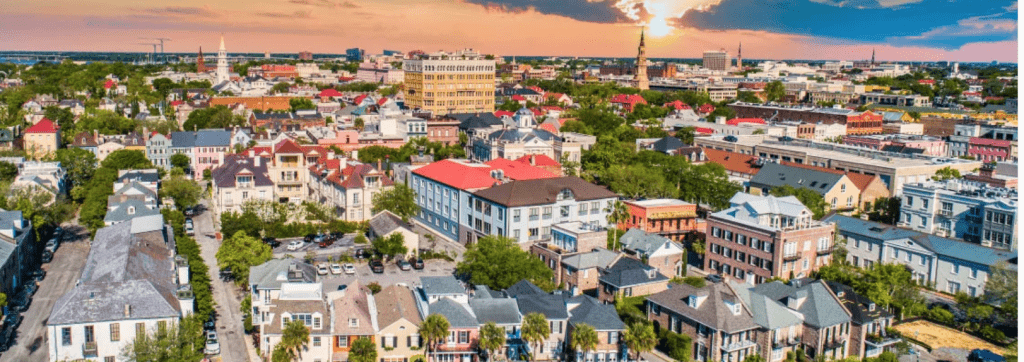
Students in WGS’ capstone course worked on a group project about Charleston Housing Resources for their final project. Their project includes a website (https://laineystern.wixsite.com/website) which delves into the issue of housing inequity in Charleston, SC and the root causes of this problem in our local community. In addition, they outline local organizations and resources for those facing housing inequities. We encourage people to view their website to learn more about this issue impacting numerous people in our community.


Summer fun can include time in the classroom! Take a look at the courses being offered for Maymester, Summer I, and Summer II that are a part of Women’s & Gender Studies.
MAYMESTER
Feminist Pedagogy, WGST 320.01, CRN 31386, Online, Dr. Kris De Welde
Pedagogy is the term used to describe approaches to teaching and learning. In this course we will explore pedagogies that are informed by, for example, feminist, critical, anti-racist, liberatory, and abolitionist perspectives with attention to the ways that students’ education experiences may or may not reflect these approaches. Informed by queer feminist critique of artificial binaries (such as student-teacher) and power dynamics in educational spaces (which reflect broader in/equities), we will consider how engaged and liberation-focused pedagogies can “spill over” beyond classroom spaces into other aspects of our lives. We will engage in reflective practice – individually and in community – to imagine how these approaches can move us toward social justice.
Psychology of Gender, PSYC 350.01, CRN 31322, Online, Dr. Lisa Ross
This course presents social, cognitive, biological, evolutionary and cross-cultural perspectives on gender, including gender development and roles. Major themes include nature and nurture contributions to gender, gender differences versus similarities, gender versus sex, the influence of gender assumptions, biases and roles, and challenging prejudice to improve gender relations.
Psychology of Social Change, PSYC 332.01, CRN 30385, Online, Dr. Jennifer Wright
In a world struggling with a number of serious environmental and social-justice issues, how do we effect social change? How do we create a healthier, cleaner, safer, more compassionate world? How do we, as individuals, become better people? In this class, we will select environmental and social justice issues, and then explore theoretical and empirical perspectives on how our beliefs, reasoning, and emotions–as well as our goals, desires, and fears–positively and negatively influence our attitudes and actions concerning these issues. We will review the literature on habit formation and the ways in which people can effectively change their attitudes and behaviors, both as individuals and as societies. In the process, we will tackle the applied problem of actually enacting change in our own lives.
Women’s Health Issues, HEAL 323.01, CRN 30656, Online, Dr. Christy Kollath-Cattano
The course deals with a wide variety of health issues of concern to women. Major categories of topics include utilization of the health care system, issues of concern to women of diverse backgrounds, normal physiological health and well-being, common physiological and psychological health problems, and cultural as well as societal influences on women’s health.
SUMMER I
Human Sexuality, HEAL 217.01, CRN 30947, Online, Dr. Sarah Maness
The format focuses on providing information necessary for establishing a sound knowledge base on topics including sexual anatomy and physiology, birth control, basic psychological concepts of sexuality, sexually transmitted infections, family planning and parenting. The information is presented in relation to the decision-making process as applied to understanding one’s own and others’ sexuality.
SUMMER I & SUMMER II
Intro to Women’s & Gender Studies, WGST 200.02, CRN 30744, Online, Dr. Kaj Brian
Intro to Women’s & Gender Studies, WGST 200.01, CRN 30682, Online, Dr. Malia Womack
This is an interdisciplinary course designed to explore the rich body of knowledge developed by and about women and gender. We study gendered structures and their consequences in contemporary cultures and societies. In addition, we examine feminist theories and relevant social movements.

WGST 250: Approaches to Research & Practice in Women’s & Gender Studies
CRN 16554, TR 1:40PM-2:55PM
Prof. Kris De Welde
This is an inquiry-based course that offers a primer to the theoretical, conceptual and methodological frameworks in Women’s and Gender Studies. Students will engage with intersectional and interdisciplinary approaches to research and activism in an effort to understand more fully concerns of power, oppression, and liberation that are central to the discipline. Counts as an elective for WGS majors and minors.